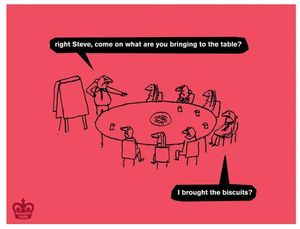Over the last month or so, I’ve been lucky enough to spend a fair amount of time with some of the UK’s foremost social business thinkers, letting their ideas ferment alongside my own. And I’ve been proudly commenting on blogs which extol the virtues of only loosely defining what social business is.
But the more I’ve thought about business culture v social technologies, the more convinced I am that culture beats tools hands down. Internal communications becomes central to any organisation's performance.
The role of a social business consultant therefore becomes:
To help organisations develop and share a unifying and supportive culture
To advise on and introduce the most appropriate social tools to help people within organisations flourish and therefore do their jobs better
And while some businesses, particularly smaller, often newer and more nimble businesses find it easy to encourage everyone to adopt the same culture, adopting and adapting tools to help them do so, others are stuck in hierachical, geographical and political structures which make it harder to foster a shared culture.
To paraphrase some points from Euan Semple, JP Rangaswami and Lee Bryant recently:
For most of the 20th century, business communications relied on a cascades of paper, and business ‘memory’ relied on hierachical and structured filing systems. But now social technologies mean that networked communications can be much more the norm. And people can more easily find people (not follow processes) to help them do their job better. As things were before the industrial revolution.
It’s no co-incidence that many of the bigger businesses which have ‘got’ social, have done so as a result of dealing with a crisis or a series of crises, because crises inevitably create a single challenge and focus for an organisation (the equivalent of a shared culture). During crises, hierachies go out of the window in favour of speed and skill. And crises rely upon a realtime data/feedback/information loop. Which I guess is partly how I’ve become so fascinated with social business as a concept – from running comms around crises.
The challenge that most organisations have – and which is great to hear people from Bupa (Nick Crawford), WWF (Adrian Cockle), IBM (Delphine Remy Boutang) and Adobe (Simon Morris), speak about before/during social media week and at Will McInnes‘ first social business session – is how to take larger organisations who haven’t had to focus on a crisis, on the cultural and technological journey towards becoming social businesses.
Social technologies can help organisations adapt some of their structures. But they will only really work if the organisational culture is ready for it. The organisation needs to be truly ready to listen to and act upon internal and external feedback.
You don’t become a social business by using the shiniest newest network featured on Mashable or Techcrunch.


